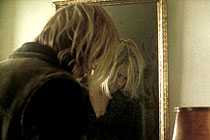|
|
|
|
Last
Days
|
 |
|
The career path of Gus Van Sant is undoubtedly among the strangest that the American cinema has ever produced. After his outlaw beginnings in the art scene and the queer film movement, Van Sant began seeming mainstream – a sell-out, even – with Good Will Hunting (1997) and Finding Forrester (2000). But his odd remake of Psycho (1998) gave notice that he was not going to remain a servant of the Hollywood system for very long. Over three films – Gerry (2003), Elephant (2003) and Last Days – Van Sant has created a space of creative freedom for himself that most filmmakers must envy. His work now concentrates on non-narrative experimentation – and yet he has the commercial backing of HBO television. It seems that all Van Sant needs is a popularly recognisable hook – a star like Matt Damon, or a topic like the Columbine massacre – and then he is left alone to spin whatever arabesque he pleases around this pretext. In Last Days the hook is Kurt Cobain – specifically, the last few days leading to the star's death. Michael Pitt plays Blake, the lightly fictionalised Cobain figure. But do not expect anything spectacular. Van Sant has made a film militantly devoid of drama, conflict, even pathos. Blake mooches around, blinks out occasionally, and answers the door to a few visitors. A gaggle of musicians and hangers-on (including Asia Argento as Asia) idly frolic around the large, country estate in which these last days and nights unfold. Only an occasional phone call informs us of the pressing, real-world obligations which Blake is avoiding. Although Van Sant might be suspected of pursuing a certain, Warholian, you-are-there realism, in fact his film is rigorously unrealistic, comprised of a series of bold subtractions. Blake looks dangerously high throughout, but no drugs are glimpsed (only a stray bottle of booze). The lifestyle of rock-star decadence is reduced to a vague bedroom grope involving two guys (not Blake). The musical element is confined to one mumbled song and a highly surreal, one-man jam session where Blake samples himself, forming a series of overlapping musical loops. Even the all-important moment of death is elided. But, beyond its evident gumption – the title plays hell with movie promotion protocols, especially when you see it in every ad, on every poster, part of every marquee – what exactly does Last Days amount to? Unfortunately, much less than either Gerry or Elephant. The film is likely to disappoint Cobain fans as well as those unfamiliar with the star's life and work, since nothing is offered to either bolster or debunk his mythic image as a genius, visionary and rebel – although Van Sant does go so far as to hint that he might have been some sort of angel. The film suggests metaphysical themes, such as Blake's communion with nature (there are many echoes of Terrence Malick's movies), or the baroque rumination on time and space already offered by Elephant (using narrative and stylistic techniques heavily borrowed from Hungarian director Béla Tarr). Or it could be about solitude. Or the inscrutability of human behaviour (a favourite Van Sant subject: we cannot look into the mind of the Columbine killers, we cannot know what happened in Kurt's last days ... ). Take your pick, because nothing is developed beyond a few sketchy images, lines or scenes. Still, if there is something worthy of being called Pure Cinema, this is it. Weeks after having seen it, the minimalist images and sounds of Last Days are still burnt into my brain: the sound of running water, the slow backwards movement of the camera, the spaced-out gestures of Pitt, the superb compositions of cinematographer Harris Savides within the unusual square frame (beware any cinema which projects it using the standard, rectangular format). Van Sant may not give us much to think about, but he offers a purely formal pleasure worth remembering. © Adrian Martin August 2005 |
![]()